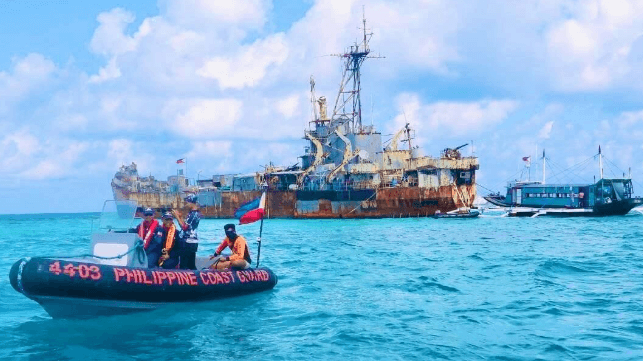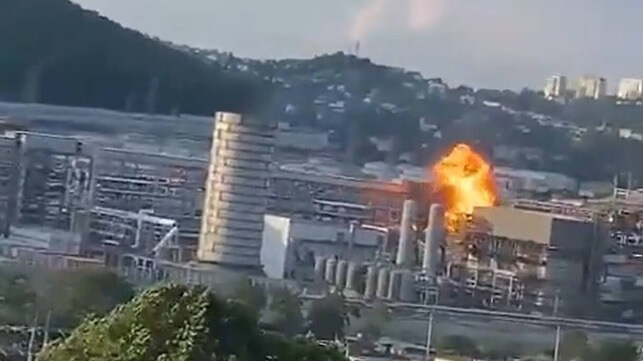WWIII
Fragile Agreement Holds as China “Monitors” Philippine Resupply Effort

The agreement between China and the Philippines for the resupply missions to the Philippines base aboard the vessel BRP Sierra Madre continued with the third unchallenged delivery to the base. Both sides acknowledged the mission in an apparent recognition that the non-disclosed agreement has so far been able to lower the temperature and advert the recent confrontations.
Chinese state media on Friday, November 15, issued a brief statement saying that its Coast Guard had “maintained oversight throughout the process.” They reported, “With China’s approval, the Philippines resupplied an illegally grounded military ship with living necessities.”
The China Coast Guard in its statement said, “It is hoped the Philippines will honor its commitments, work with China in the same direction and jointly manage the maritime situation,” the South China Post reported. However, later in the day, a spokesperson for China’s defense ministry reiterated its commitment to safeguard its territorial claims and maritime rights and to “counter infringements and provocations.”
A spokesperson for the Armed Forces of the Philippines confirmed the mission had taken place on November 14. They said, “There were no untoward incidents during the mission.”
It marks the third resupply mission since reports of an agreement between China and the Philippines in July aimed at reducing some of the tensions in the region. Unnamed sources in the Philippines told the Associated Press that the deal set a “temporary arrangement” to let the Philippines transport supplies and troop rotations to the vessel despite China’s demands that the Philippines withdraw from the Second Thomas Shoal in the South China Sea.
China reportedly had demanded that the Philippines provide advance notice of the resupply missions and permit inspections of the vessels conducting the supply missions. China reportedly agreed to waive those demands while continuing to say the Philippines must abandon the post.
The Philippines has maintained the outpost aboard the beached World War II-vintage vessel BRP Sierra Madre since 1999 as part of its territorial claims to the area. Already considered one of the primary flashpoints in the South China Sea, the situation escalated in 2024 with a series of confrontations. Chinese vessels attempted to block the Philippine vessels, including several contact incidents, alleged intentional ramming, and frequent use of water cannons.
Associated Press highlights that while the incidents at the Second Thomas Shoal have ceased recently China continues its incursions throughout the region. In addition to the Philippines, Vietnam, Malaysia, Taiwan, and Indonesia have all complained of incidents.
After Ukrainian Drone Attacks, Three Russian Refineries Set to Close

Three Russian refineries that were hit by Ukrainian drones earlier this year could soon close, according to Reuters. The affected facilities are having a harder time competing in an environment of higher oil prices, and their expected closures are believed to be motivated by finances.
The refineries include two small independent facilities, Ilsky (in Krasnodar) and Novoshakhtinsky (in Rostov). The Tuapse refinery, owned by state oil firm Rosneft, was built in 1929 and despite several rounds of technological upgrades, its infrastructure is relatively dated. It is the sole Russian refinery on the Black Sea coastline and is particularly vulnerable to Ukrainian attacks.
All of these plants have been hit by Ukrainian drones. Tuapse was hit three times, once in January and again in May and July, forcing it offline each time. It has also shut down voluntarily several times because of weak refining margins.
If Tuapse shuts down altogether, it would have minimal impact on the Russian domestic market or the Kremlin's war effort. Its 240,000 bpd of fuel production is sold almost entirely to overseas customers, primarily in Turkey and in the Far East.
The Ilsky refinery is a 130,000 bpd refinery in the Krasnodar region, about 35 miles inland from the port of Novorossiysk. It was hit and damaged in a Ukrainian drone strike in June, and it has applied for government assistance to help with modernization upgrades. Russia's extra-high wartime interest rates (currently 21 percent) have made it hard to borrow for industrial projects like refinery improvements.
The Novoshakhtinsky refinery is an independently-owned topping plant in the Rostov region, and can produce about 100,000 bpd. It was attacked by Ukrainian drones in March, April and June, and was partially closed for repairs until August.
No comments:
Post a Comment